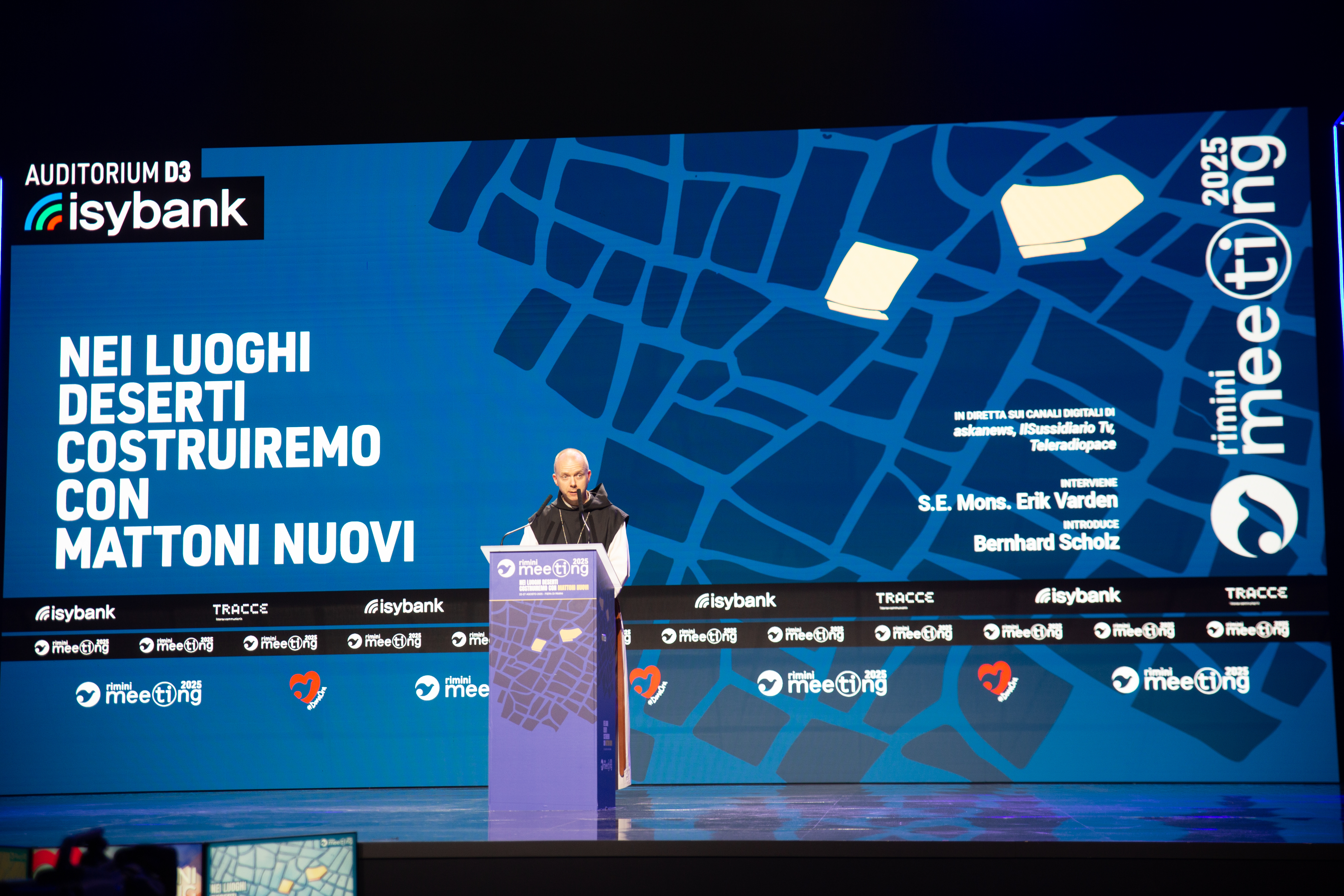Rimini – At the 2025 Meeting for Friendship Among Peoples, the chosen theme — “In the desert places we will build with new bricks” — found an original and profound voice in the reflection of Erik Varden, a Trappist monk, bishop of Trondheim and president of the Scandinavian Bishops’ Conference. Invited to offer a meditation on the title inspired by T.S. Eliot’s Choruses from The Rock, Varden wove together Bible, poetry, and history, offering an invitation to rethink the construction of both society and the Church in an age marked by individualism and fragmentation.
From the Garden to the City: a fragile construction
The Trappist bishop recalled that the human impulse to build is as old as humanity itself, yet not original: “In the beginning there were no houses. Primordial man lived in a garden, in harmony with creation.” From that lost Eden, humanity sought refuge in the city, but not without ambiguity: the first was founded by Cain, the fratricide. “The city arises as a form of life for those in conflict with bonds of blood,” Varden explained, recalling how urbanization carries both possibilities of coexistence and temptations of exclusion and domination.
Scripture itself bears witness to this tension: the Tower of Babel, built “for ourselves”, marks the moment when man seeks to replace God. By contrast, Jerusalem, built as the dwelling of the divine Presence, becomes the paradigm of a redeemed community: “A human covenant made possible by the real Presence in its midst.”
Hospitality, Law, and Reconciliation
Retracing the Scriptures, the prelate emphasized the importance of hospitality as the foundation of society. Abraham, who welcomed the three men at Mamre, becomes an “icon of the Trinity as hospitable communion.”
Thus the Mosaic Law and sacrifices were not acts of superstition, but a way to “teach man to consider his labor in the light of an eternal end.” Coexistence, he noted, remains fragile and needs rituals of reconciliation: “To belong to the social body means recognizing responsibility for a higher life, in which one inevitably fails, and therefore being called to ask for forgiveness.”
Eliot and the inner deserts
For Varden, the reference to Eliot was an occasion to bring the challenge into the present. If in 1934 the poet saw the desert places not in the outskirts but in the hearts of men, today that diagnosis resonates even more forcefully: “Men have abandoned God not for other gods, but — they say — for no god.” Here arises modern solitude, made of dispersion and alienation, even within prosperous cities.
Yet Eliot — and with him the monk Varden — does not stop at criticism: “The soul of man must vibrate to creation,” the bishop quoted. And this vibration is born of faith and love, the only true furnaces where the new bricks can be fired to endure.
 © Meeting Rimini
© Meeting RiminiThe Church as seed of unity
The final part of the address had a strongly ecclesial tone: the Church, Varden recalled, still has decisive words to speak, “words no one else utters: it speaks of life and death, of evil and sin, of true happiness and of freedom.” Even when fragile or marginal, it remains “a sure seed of unity, hope and salvation for all humankind.”
It is not enough to build houses or cities, the monk warned: “What man needs in order to flourish is not merely a house, but a hearth where the light remains burning.” And this hearth can only be born of love, the “furnace in which the new bricks are fired to withstand time.”
A task for today
In a climate of division and disorientation that runs through contemporary societies, Varden issued a call not to yield to pessimism but to begin again from what matters: “Where the bricks have fallen we will build with new stone. Where the beams have rotted we will build with new timber. Where the word has not been spoken we will build with new language.”
His reflection at the Meeting closed with a luminous image: the construction we are called to begin is not only external but interior, and comes to fulfillment only when we ourselves become a living temple, a “dwelling place of God in the Spirit.”
Marco Felipe Perfetti
Silere non possum